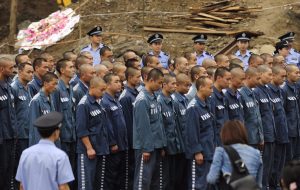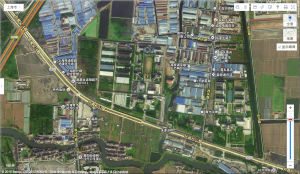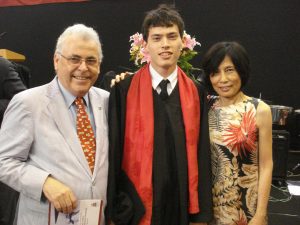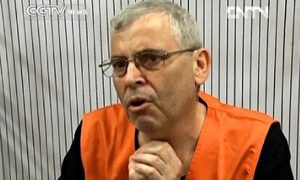The author of this article Peter Humphrey is one of the West’s most knowledgeable China specialists. He was a foreign correspondent with Reuters for two decades and later worked as an anti-fraud consultant for multinational corporations in China. In 2013 Mr. Humphrey and his wife were arrested and arbitrarily imprisoned for two years on trumped-up charges of illegal information gathering while conducting an investigation for a client company.
The Romanian teacher Marius Balo from Cluj, arbitrarily imprisoned in China for eight years, is expecting to be released from a Shanghai jail and shipped home to Romania at the end of this month, according to a network of victims of false imprisonment in that country.
Shanghai Qingpu Prison
A South Korean who was set free from the foreign block of Shanghai’s Qingpu Prison two weeks ago has delivered an oral message to Balo’s friends stating that he will be released on 29 March and he was looking forward to coming home and telling the Romanian public his story. He says he was duped into accepting US$80 from a man who used his passport for criminal purposes.
Mr. Balo, now 40 has spent eight years in captivity in grueling conditions inside China’s prison system. He arrived in China in 2010 to work as a university English teacher, and was arrested by Chinese authorities in March 2014 and charged with a ludicrous alleged US$80 contract fraud and was later, in 2016, sentenced to eight years and fined 13,600 Euros.
Fine
His Romanian uncle, who is said by Romanian media to be his only relative in Romania, although he has other relatives in neighbouring Hungary, is said to have paid the fine by selling a flat in Cluj, otherwise Mr. Balo could not have left China for home because he had not paid his fine.
His uncle organised an appeal process in the Cluj Court of Appeals which ruled in 2019 to demand a prisoner transfer from China to a Romanian prison, according to Romanian media reports, but it was forced to recognise the Chinese court conviction in order to take this request.
Bureaucratic barriers
China agreed to the transfer but has evidently failed to honour it before the completion of Mr. Balo’s eight year term this month. China has a history of erecting bureaucratic barriers against smooth transfers, and Covid has not helped – Romania was unable to send police officers into China to collect him because China was closed, so he has served his full term. If he had falsely confessed to a crime, he might have earned a reduction.
Mr. Balo’s lawyer in Romania Eugen Iordachescu, has been critical of the Romanian state for failing to bring him home earlier.
Over the last two years, China has also used Covid restrictions as a pretext to prevent prisoners who have served their full terms from returning to their home country. In some instances, released prisoners have been held in ‘quarantine’ in immigration detention centres for a full year after release from prison. “That quarantine measure has now been ended,” the Korean said, so Mr. Balo should be able to fly home if he can get a ticket.
Hunger strike
In November 2020, Mr. Balo staged a hunger strike in protest against the delay and the failure to implement his transfer, and he issued an emotional appeal to Romania to fetch him. But Romania failed to do so.
Mr. Balo’s legal representatives have denounced the conditions he was held in at the prison as “inhuman” and claimed he had to work 12 hours a day seven days a week to gain the right to food. But Mr. Balo will now be able to tell that story personally.
Mr. Balo admitted lending his passport to a Chinese national who then misused it to register bogus companies in the UK which later committed some frauds. He said he received only US$80 from the Chinese national and did not know of his criminal intentions.
Chinese indictment
His Chinese indictment and judicial ruling – which should be public records – have never been made public, not even by the Romanian Justice Ministry, which is said to have a copy.
A fraud investigator’s perspective
As a former fraud investigator for 15 years in China, and as a victim of false imprisonment there personally, I have encountered many cases where somebody who played a minor or unwitting role or no role at all in a fraud received the harshest sentence, while the real perpetrator was either released or got a light sentence.
‘Quanxi’
This is usually the result of interference in the case by criminals using their „guanxi” (influential contacts ) and bribes to enlist Communist party officials and police to frame a scapegoat and then walk free. I witnessed many instances of this among prisoners who I met in the Shanghai Detention Centre and Qingpu Prison, where Mr. Balo was held.
I now mentor many families with loved-ones locked up in a Chinese prison in similar circumstances. These include several Americans fighting death sentences who were tricked into carrying hidden drugs across the border, while their masters were allowed to evade arrest and trial because of police connections. They include a Dutchman whop is serving jail time for meat smuggling when the real culprit may have been a senior local official. They also include a Singaporean lawyer who is serving an unlimited life sentence in Qingpu on false fraud charges whose jailing was engineered by the real fraudster to prevent the real story getting out.
Injustice
In China this is an extremely common form of injustice because there is no independent judiciary. Fair and transparent trials do not exist. All the key organs, the police, the judiciary, the prosecution, and even the legal profession, are from the same family – the Communist Party. There is not a single person detained or imprisoned in China who as ever had a fair and transparent trial with a proper defence. It is simply not possible in that system. No Chinese criminal conviction would survive the scrutiny of a real court in a fair and transparent trial in a country under democracy and the rule of law, be it in America or Romania.
Fraudsters
It is also no surprise to me if Mr. Balo’s passport was abused by a fraudster. In China it is common that fraudsters use and abuse somebody else’s ID document in order to commit a fraud. It may be a contract fraud, a purchasing fraud, or the fraudulent registration of a company in somebody’s name using his ID. the victim may be a naive friend like Marius or it may be a 90-year-old demented grandfather.
I personally uncovered many such instances in my 15 years of fraud investigation in China as well as in the arbitrary imprisonment cases where I am currently advising victims’ families.
And even if the person to whom Mr. Balo loaned his passport was a Romanian intermediary, as has been suggested, it doesn’t mean that the Romanian cheat was not working for a Chinese person who stayed hidden behind the scenes.
Transparent trial
This is why a fair and transparent trial is important, to establish the facts, weigh all available evidence, and listen to the defence and not just the prosecution arguments. But no such fair and transparent trial was held for Mr. Balo. Today defendants never get properly heard in China.
The only fault of which Mr. Balo is guilty is, in all plausibility, mere naïveté.

– – – –
An interview with his cell buddy
I recently interviewed Dima Siakatsky, a Belarusian who was released from Qingpu Prison last summer after 40 months in detention for an alleged abuse of a credit card. He was Mr. Balo’s cellmate from February 2019 onwards. Like many prisoners, including Mr. Balo, Mr. Siakatsky never had a fair and transparent trial.
China’s jails
“Marius is no longer the same young guy that you see in the photos in the newspapers. He is a man with thick stubble. He has not a single gram of extra weight and he is completely bald,” Mr. Siakatsky said, reflecting the physical deterioration of prisoners which I became so familiar with during my own time in China’s jails.

“In February 2019 I was transferred to the prison block for foreigners and from then Marius and I became good friends. We both read a lot and shared our impressions. My English was poor and Marius never refused to help me with my studies,” Mr. Siakatsky said.
Beautiful handwriting
“Marius is very religious, and he knows the Bible very well. He speaks excellent English. Marius even taught English in the prison. He has beautiful calligraphic handwriting. He is a very polite and sympathetic man. He is very honest and trusting. Other prisoners often took advantage of him. They always used to pressure him to give them the dried noodles that he bought from the prison shopping system. When someone asked him for noodles, Marius gave them freely with the words, “take it, my brother”. But they never returned the favour. Such things were always “borrowed” and never returned, but Marius disinterestedly gave away what was his. By contrast, he and I often genuinely shared things with each other,” Mr. Siakatsky said.
Detention centre
“We talked about his case sometimes. As I remember correctly, Marius was first approached not by a Chinese, but by a Romanian with a request to use his passport, and for this Marius received 500 RMB (approximately US$79). For a low-paid teacher in China, this money was helpful. Most importantly, Marius did not for one minute think that illegal actions would be committed. Time went by and he forgot about this incident, when suddenly he was arrested and thrown into a detention centre, one of the most terrible places where a person can be,” Mr. Siakatsky said.
“In this pre-trial detention centre, a dozen detainees are kept in a room of about 15 square metres. There can be a different number of people in different cells, I heard that in some there were up to 20. There are no beds. They sleep side by side on the floor on blankets that have already been used many times. During the day they sit on the floor, sometimes they walk around in circles. They also eat while sitting on the floor. Unlike in the prison, Chinese and foreigners are kept together in these cells, which often leads to conflicts, he said.
Consul
“You cannot contact relatives, send a message about yourself, or get something you need. Only the consul of your country can hand over clothes to you and deposit money from your family into your detention centre account,” he said.
“In many countries, where detention conditions are still human, time spent in pre-trial detention centre is multiplied by two and deducted from any eventual sentence. If a suspect spent six months in pre-trial detention, one year is deducted from the sentence. But not in China. The prisoner in China is kept in these cells until trial, and he has no idea when his trial will take place.
Guilty verdicts
“And 99.92% of cases end in guilty verdicts. The attempts of the unfortunate poor fellows to appeal look both funny and sad. It’s useless hoping for an acquittal in court. If you are arrested in China, the main question in every detainee’s mind is how many years you will get, not whether you will be found guilty or not. Whether you broke the law or not is a secondary issue,” Mr. Siakatsky said.
“That is what happened to Marius. This is an absolutely law-abiding citizen, a teacher at the university, who graduated from a theological seminary, never had problems with the law, the insignificance of his role in the case was obvious. He himself became a victim of fraudsters. But he got a harsh sentence of eight years. So he ended up in Qingpu, where we met each other,” Mr. Siakatsky said.
In prison, where participation in manual manufacturing labour (such as packaging Christmas cards for foreign brands like Tesco) was mandatory, Marius never refused to work. He also taught English. Working is one of the prerequisites for earning sentence reductions, receiving a transfer to your home country, or for being allowed to buy extra food.
Media reports
Mr. Siakatsky disputed media reports that Marius had to work 12 hour days. “I have never seen foreigners work 12 hour days. “Usually they work until around 5 pm with weekends off.” But Chinese prisoners indeed worked 12 hour days for at least six days a week, he said.
“By the autumn of 2019, Marius’s transfer was officially approved, and he began to get ready to go home. He passed a special medical examination. He even started giving away his bits and pieces to other prisoners and bought treats for all the prisoners to celebrate his supposed departure. But then Covid struck. From October 2019 until the closing of the borders in March 2020, there was enough time to transfer Marius to Romania but it didn’t happen. It was a difficult time for him. He was constantly on standby. It was much harder mentally than physically.

Tesco Christmas card scandal
“In that period, work in the prison had also stopped because of the Tesco Christmas card packaging scandal which was reported in a British newspaper, and then came Covid. So we just read books and discussed them, improved our English, and dreamed up plans for the future. I remember how we discussed Dostoevsky’s The Brothers Karamazov. I tried to explain to Marius in detail what exactly the meaning was conveyed by the elder Zosima. I read it in Russian while he read it in English. We also read the biography of Gandhi. I remember how surprised we were when we learned that Gandhi was in correspondence with Leo Tolstoy.
Intermittent fasting
“In general, Gandhi had a great influence on Marius. He began to practice intermittent fasting. Marius does not eat for two days per week. I think he has been practising this for over two years now. I also practice this fast sometimes, Mr. Siakatsky said.
“I remember Marius in the spring of 2021 asking the new chief officer of the foreigners’ cell block for news about his transfer and if there was a chance to get a sentence reduction, because he had not committed a single misdemeanor and he had a record as a good prisoner. Unlike me, he had never clashed with anyone. He received an answer that there was no progress with the transfer, and if he wanted to apply for a sentence reduction, then he must pay 2,000.000 RMB ($315.000 $).He had already paid $15,700 for his fine,” Mr. Siakatsky said.
Additional trap
“It was only then that we learned about this additional trap. The amount of $315,000 was the total involved in the case, but this damage figure was pinned separately on each member of the fraud gang, so that meant $315.000 demanded from each defendant for damages, plus a fine. It now became clear to Marius that he had no chance of transferring to Romania or receiving sentence mitigation for good behaviour, participation in labour and payment of his fine. This sum of money is a strange story. Why had this not been mentioned before? The non-payment of the damages and restrictions due to Covid, are unlikely reasons for the refusal to transfer him to Romania. As the $315,000 was demanded but not paid, Mr. Balo spent another year in jail,” Mr. Siakatsky said.
Prisoner transfer
“I have compared this with another case where somebody received glaringly different treatment. In the summer of 2021a French prisoner was approved for a prisoner transfer to France. His case also involved substantial alleged financial damage. At that time there were also air tight blocks on travel due to Covid. And there is no formal prisoner transfer agreement (PTA) between France and China. This French prisoner served far less time in prison than Marius. His transfer was decided very quickly. In about one year. I must say that he is the only prisoner in my memory who got his transfer. But many have applied – citizens of Russia, Germany, Iran, Philippines, Africa. All of them are today still in Qingpu, although in theory each of them can officially be transferred to their native land based on existing bilateral agreements, to serve the rest of their sentence,” Mr. Siakatsky said.
“Marius does not blame anyone for the current situation. He is grateful to everyone for the work done, for trying to transfer him to Romania,” Mr. Siakatsky said.
The future
“Marius feels that this entire ordeal has changed him a lot. The prison did not break him, but eight years is a long time. He has big plans for the future and there will be more talk about him, I’m sure,” Mr. Siakatsky said.
.
“Marius will be released on March 29 this year. By this date, he must purchase a plane ticket, otherwise he risks staying in China indefinitely in an immigration detention centre. If the released person does not buy a ticket at his own expense, then he continues to be treated as a prisoner. I know cases when former prisoners remained in China in prison conditions for another year. I hope Marius returns home without delay. I’m sure he will tell you all his story in detail,” Mr. Siakatsky said.
The author
Peter Humphrey is a guest contributor to Universul.net who has spent 47 years as a China specialist. He spent two decades as a foreign correspondent with Reuters, including four years as Bucharest bureau chief from 1990 to 1994. He later spent 15 years as an anti-fraud consultant for multinational corporations in China. In 2013 he and his wife were arrested and arbitrarily imprisoned for two years on trumped-up charges of illegal information gathering while conducting an investigation for a client company.






















